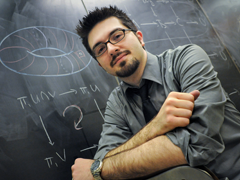Josh Roberts
Ph.D. Student
by Robin Roenker
Josh Roberts didn’t always aspire to become a mathematician. "I took the time to find out what I really wanted to do," Roberts said. Between finishing high school and beginning college he was employed in jobs as varied as census taker to marina attendant. Roberts finally settled on sign language and enjoyed a seven-year career as a sign language interpreter before returning to college to receive his undergraduate math degree.
In college he initially planned to major in philosophy. But after taking his first college calculus class as a freshman, he was hooked.

“There’s a beauty and aesthetic quality to math that people tend to miss,” said Roberts, now in his fifth year in UK’s mathematics PhD program.
Roberts, a native of Wise County, Virginia, and graduate of the University of Virginia-Wise, focuses his research on algebraic topology.
Some mathematicians use algebra to study topology—a branch of math that studies how certain shapes can be stretched or twisted into new shapes without “tearing.”
Roberts explains topology like this: “Think of it as rubber sheet geometry. If you draw a square on a rubber sheet, you could stretch it out and turn it into a circle - so topologically speaking, a square and a circle are the same thing.”
But what Roberts does is the reverse. He uses topology to study algebra.
Specifically, Roberts is using computational techniques to investigate topological spaces associated with Fields Medalist Daniel Quillen’s conjecture about certain classes of linear groups. Quillen is most noted for his formulation of higher algebraic K-theory in the 1970s.
Roberts calls his own research work “experimental mathematics...it’s kind of the intersection of pure math and computer science,” he said.
UK math professors Marion Anton, Roberts' dissertation advisor, and Serge Ochanine have been immeasurably helpful to his topology research, Roberts said.
“I’ve spent hours in Dr. Anton’s office, trying to figure things out,” Roberts said. “One of the great things about the graduate math department at UK is that the professors are extremely approachable.”
Roberts said that his dissertation committee co-chair, UK math professor Edgar Enochs, has also been a great influence mathematically. "He’s taught virtually every graduate course, and we all look at him as someone who knows an immense amount about a lot of different things."
Roberts hopes to complete his dissertation over the next year and enter the job market in the fall of 2010. He is looking forward to a college or university position that will allow him to both teach and do research.
He and his wife of 11 years, Kelly, a licensed massage therapist, have enjoyed their time in Lexington with their dachshund, Frodo.
While at UK, Roberts has enjoyed the chance to teach everything from Math 109, introductory college algebra, to Math 322, linear algebra.
“I love those ‘aha’ moments,” said Roberts, who enjoyed a seven-year career as a sign language interpreter between graduating from high school and returning to college to receive his undergraduate math degree. “When suddenly you see a student understand a certain thing in math they’re trying to learn, it’s such a rewarding experience to have.”
Roberts said he feels many students’ math anxiety stems from never having had a teacher who really loved the subject. He hopes to change that.
“A really general definition of mathematics is just looking for patterns and looking for symmetry in different things,” he said.
